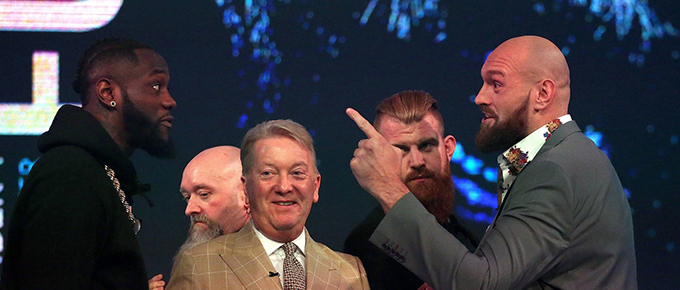Tyson Fury’s special victory in dominating Deontay Wilder with a blend of boxing nous, power and poise, raises the 31-year-old to the level of extraordinary in his field.
Lennox Lewis, the last undisputed heavyweight champion of the world, called himself a “pugilist specialist”, and Fury is exactly that… yet so much more.
Fury’s two greatest triumphs – or three, if you include the controversial draw with Wilder in Los Angeles – have been in deposing Wladimir Klitschko, the second longest reigning heavyweight in history, and now Wilder, seen as one of the most dangerous punchers ever.
Wilder’s five-year, 10-fight reign was obliterated, his mystique destroyed. “The Hammer from Alabama” was reduced to a confused man on wobbly legs in Sin City. Likewise Klitschko in Dusseldorf in 2015.
On both occasions, the two champions opposing Fury finished befuddled and broken.
What makes Fury so remarkable, as his promoter Frank Warren insisted after the fight, was that the 6ft 9in, 19½st boxer simply picked up this fight from the moment the first one ended. Fury was down in that 12th round in Los Angeles, hauled himself to his feet, and then fought on to counter his aggressor.
From the opening bell to the white flag of surrender from Wilder’s cornerman Mark Breland in the seventh round, the Lancastrian from 10 generations of fighters who says he “was bred to fight” put Wilder on the back foot, bullying the ultimate bully, who, in 43 fights, had made 95 per cent of his challengers knockout victims. It is what makes Fury special. Never beaten, never broken. It is in his blood, his DNA. Fury is a survivor, a tale of the age.
“This was the best night I can ever remember,” said Warren, 45 years in the business. “We have had great nights bringing British boxers to America, Naseem Hamed, Frank Bruno, Joe Calzaghe, Ricky Hatton, but this is the best ever. Tyson Fury achieved this in the capital of world boxing, against the most dangerous puncher of the last 35 years.”
It was a triumph of strategy and self-belief, all emanating from Fury himself, who appears to channel self-belief, combined with innate skills which he can rely on with his ring intelligence to implement against diverse opponents.
Those in boxing, those who know their boxing, have always held Fury up as the best boxer of the generation, and on this form, he would be too hard a puzzle, moreover, for Anthony Joshua, who holds the other three belts.
This was one of the greatest performances by a British boxer abroad, like his display against Klitschko. It was fitting that on the night Fury was crowned the king of the heavyweight division, also recognised by the Ring Magazine – known as the Bible of Boxing – Lewis, Mike Tyson and Evander Holyfield were honoured together in the ring before the start. They were the dominant figures from three decades – 1980s, 1990s, 2000s – and with Fury having ended Klitschko’s near decade-long reign, the new dominant heavyweight has been confirmed.
The fight with Joshua, an all-British affair, will break all box office records, and must happen – in the US, Saudi Arabia, or the UK – but Fury’s claim of being lineal champion through the ages now rings true more than ever.
It cements him as one of the greats of the heavyweight division, and, given his size and abilities, both physical and mental, comparable to anyone in history. Add in the context of Fury’s comeback from beating depression and obesity, and his story ranks as one of the greatest comebacks ever. Not just in sport. But in life.
